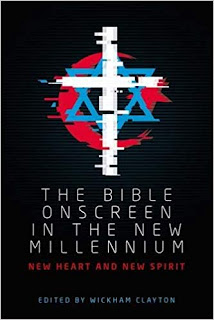La Ricotta (Soft Cheese - 1962 from RoGoPaG)
This article contains spoilers
La Ricotta is the second of four short films that were released together under the title of RoGoPaG - an abbreviation of each of the four film's directors, Roberto Rossellini (Illibatezza - my review), Jean-Luc Goddard, Pier Paolo Pasolini and Ugo Gregoretti. It was deemed so offensive that Pasolini was actually prosecuted for it.
Unsurprisingly, then, La Ricotta starts with a disclaimer. It's unclear whether this was added before to court case – to try and avoid prosecution – or as a result of it. Either way, the fuss is hard to understand today, and its clear to most that the film is satirising a sanctimonious form of Christianity, rather than the faith itself – let alone its founder.
The story takes place on the set of a Jesus film. Despite the inspirational nature of the story that is being filmed, no-one seems to be particularly excited to be there. The director (played by Orson Welles) looks on dispassionately, even reading a book in-between takes. The crowd of actors make their own entertainment – dancing, joking and even getting one of the cast to perform a striptease to taunt those pinned to the cross. 
Not all of the cast are able to behave so frivolously. Stracci, the extra who is playing the good thief, is desperately poor – so much so that when he is handed his lunch for the day he runs off to give it to his starving family. In some way the scene functions as the Last Supper as Stracci, the film's hero, enjoys the fellowship of those he loves for the last time before his death on a cross.
Indeed much of what happens during Stracci's final few hours parallels Christ's passion. Some of these elements are supplied by his role in the film (being taken away to be crucified), and some occur because of his real life situation (being mocked and deserted and then left to die). However, this is not a straightforward Christ figure – some of Stracci's actions (his lying and stealing in order to procure more food) would be seen by many as somewhat un-Christ like.
Given Pasolini's famous Marxism, and the film's subversive tone, I can't help wondering if he is looking to explore some ethical issues here. Is it acceptable for the poor and starving to steal, or impersonate others in order to feed themselves? It's a question posed later, and somewhat inadvertently, by Stracci himself. As he hangs on the cross waiting for his big moment he rehearses what seems to be his only line "Lord remember me when you come into your kingdom". If Stracci is meant to deliver the goof thief's other words from the cross he is notably not practising them.
Stracci's death is somewhat confusing. Have given away his first meal to his family he then dons a wig and a dress in order to get another lunch which he temporarily stashes away whilst he returns the items that make up his disguise. In the meantime, the leading actresses's dog escapes, discovers Stracci's hidden treasure and eats it for himself.
It's far from clear why he died. If Stracci has died because he has overeaten then Welles' final line "poor Stracci he had to die before we knew he really lived" seems overblown. Is it just an extension of the pious pompusness which he has so far exhibited – a grandstanding gesture even as one of his casts lies dead? Or does it indicate that Stracci has died of starvation and that the scenes in which he buys the cheese and stuffs his face with it is actually Stracci's daydreams as is tied to the cross? There are certainly plenty of unreal elements in these sequences – the fast forwarded action, the sudden appearance of the entire crew in he cave, the abundance of food he is suddenly surrounded by – to suggest this as a viable reading.
The film's major theme is the contrast between the story of Jesus and those who represent him. The cast's treatment of this poor man is shown as the ultimate indicator of their impiety. Does he suggest that the real representatives and re-enactors of Christ's story (i.e. the church) also fail in this respect? It certainly seems more likely that he is primarily castigating kitsch, yet technically irreverent, religion rather than the makers of religious films. The tacky colours of the crucifixion scenes – the only colour scenes in the four films that comprise RoGoPaG - are far more akin to those from pious Christianity than anything Hollywood has produced.
Thankfully, Pasolini also seems to be aware that he is no better. Whenever a film features a film director it is likely to be self-referential. But in case anyone misses the link the part is played by one of the most well known film directors of all time, and Pasolini further strengthens the association by having him read Pasolini's own book "Mamma Roma". 
It would not be long until Pasolini returned to these themes. Having pointed out the weaknesses in the human (and celluloid) conveyors of Jesus's message Pasolini filmed his version of The Gospel According to St. Matthew two years later. The portrayal Jesus as a crusader for social justice picks up from where La Ricotta leaves off.
Labels: Gospel According to St. Matthew, Il Vangelo Secondo Matteo, Pasolini, RoGoPaG














0 Comments:
Post a Comment
<< Home